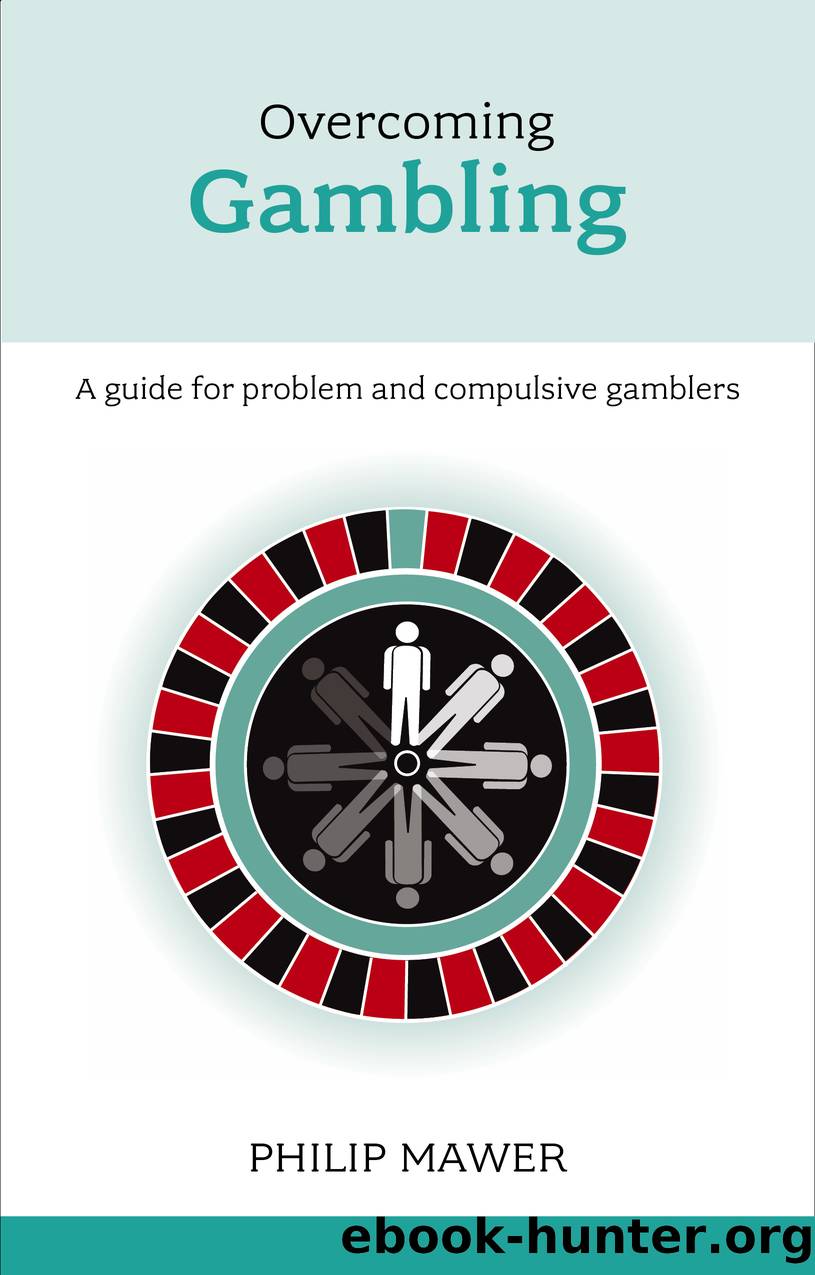Overcoming Problem Gambling by Philip Mawer

Author:Philip Mawer
Language: eng
Format: epub
Publisher: SPCK
Published: 2012-06-13T00:00:00+00:00
Emotional solitary confinement
This is the state of mind we identified ourselves as being in while gripped by the gambling addiction, and most particularly, while actually gambling. It is the state of mind we called the âtwilight zoneâ in Chapter 2. We shut everything and everyone else out and concentrate solely on ourselves. We become detached from time and, in many ways, from reality. How many times have you come out of a long, non-stop gambling session, and wondered, literally, where you had been, how you could have blown so much money?
Prolonged compulsive gambling may lead from emotional solitary confinement into a long-term state which I describe as a state of neutral emotion.
By a state of neutral emotion, I mean that as compulsive gamblers with an ever-deepening habit, we guard against showing our emotions, which in turn leads us to dilute or restrict our feelings. How often have you had to hide your happiness after a big win, or your sadness after a massive loss? Displaying your emotions openly would have meant giving away the extent of your gambling, and thereby threatening your freedom to continue. So, by having to suppress your emotions constantly, you are in turn deepening your gambling addiction further â usually just when youâre getting less and less pleasure from it.
Once you begin to fall into a state of neutral emotion, you are entering a very dangerous stage. You risk making yourself an outcast and becoming very introverted. Even if your partner notices these changes in you (and most inevitably do), it is impossible for him or her to break in or indeed for you to break out. This is where some people find meetings or forums useful, in that they allow people to âbreak outâ within the confines of anonymity. However, breaking out is not itself a cure, and can offer a false sense of security and hope if you donât go on to take responsibility for your actions and debts, and take active steps to change your ways.
Using emotional solitary confinement
The good news is that we can use our ability to shut everything and everyone else out, to cure ourselves. Go back into the zone of concentration you attain when in front of a slot machine, a roulette wheel, a dog or horse race on the television, or the dealerâs hand in a game of internet blackjack. Take that concentration and letâs call it a âring fenceâ.
Use it to guard against other peopleâs cynicism and disbelief, whether thatâs directed against the illness concept or against a belief that you can change or cure yourself.
Download
This site does not store any files on its server. We only index and link to content provided by other sites. Please contact the content providers to delete copyright contents if any and email us, we'll remove relevant links or contents immediately.
| Adult Children of Alcoholics | Alcoholism |
| Drug Dependency | Gambling |
| Hoarding | Obsessive Compulsive Disorder (OCD) |
| Sexual | Smoking |
| Substance Abuse | Twelve-Step Programs |
The Hacking of the American Mind by Robert H. Lustig(4383)
Right Here, Right Now by Georgia Beers(4212)
Fingerprints of the Gods by Graham Hancock(4004)
Goodbye Paradise(3810)
Bad Pharma by Ben Goldacre(3428)
Happiness by Matthieu Ricard(3050)
The Social Psychology of Inequality by Unknown(3031)
More Language of Letting Go: 366 New Daily Meditations by Melody Beattie(3030)
The Plant Paradox by Dr. Steven R. Gundry M.D(2621)
Drugs Unlimited by Mike Power(2594)
Confessions of a Shopaholic by Sophie Kinsella(2373)
Borders by unknow(2315)
Make Love Not Porn by Cindy Gallop(2106)
Dry by Augusten Burroughs(2102)
Stop Being Mean to Yourself: A Story About Finding the True Meaning of Self-Love by Melody Beattie(2004)
Getting Off by Erica Garza(1932)
Belonging by Unknown(1859)
Yoga and the Twelve-Step Path by Kyczy Hawk(1836)
Unmasking Male Depression by Archibald D. Hart(1808)
